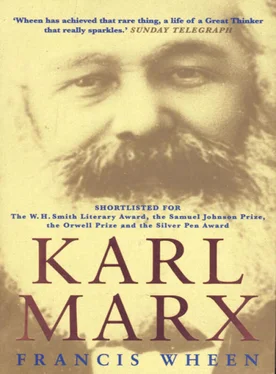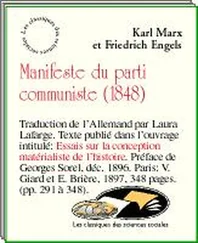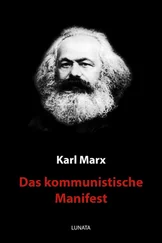He is a hunter, a fisherman, a shepherd, or a critical critic, and must remain so if he does not want to lose his means of livelihood; whereas in communist society, where nobody has one exclusive sphere of activity but each can become accomplished in any branch he wishes, society regulates the general production and thus makes it possible for me to do one thing today and another tomorrow, to hunt in the morning, fish in the afternoon, rear cattle in the evening, criticise, just as I have a mind, without ever becoming hunter, fisherman, shepherd or critic.
A rather exhausting Nirvana, some might think. Engels certainly enjoyed hunting and criticising, but did his heart really thrill at the promise of postprandial cattle-rearing?
The Marxist paradise was evoked rather more enticingly in the interminable diatribe against Stirner, who had suggested that the division of labour applied only to those tasks which any reasonably trained person could perform – baking or ploughing, for instance. No one, he maintained, could have done Raphael’s works for him. This was an unfortunate example: Raphael had teams of assistants and pupils to complete his frescoes, as Marx and Engels were quick to point out. Besides, the communists didn’t believe that everyone should or could produce the work of a Raphael, but only that a potential Raphael must be allowed to develop without hindrance.
Sancho [i.e. Stirner] imagines that Raphael produced his pictures independently of the division of labour that existed in Rome at the time. If he were to compare Raphael with Leonardo da Vinci and Titian, he would see how greatly Raphael’s works of art depended on the flourishing of Rome at that time, which occurred under Florentine influence, while the works of Leonardo depended on the state of things in Florence, and the works of Titian, at a later period, depended on the totally different development of Venice. Raphael as much as any other artist was determined by the technical advances in art made before him, by the organisation of society and the division of labour … In a communist society there are no painters but only people who engage in painting among other activities.
Activities such as hunting, fishing and sheep-shearing, presumably. The question of who would clean the lavatories or hew the coal was neither asked nor answered. When a German smart aleck tried to catch him out by wondering aloud who would polish the shoes under communism, Marx replied crossly, ‘You should.’ A friend once suggested that she couldn’t imagine Marx living contentedly in an egalitarian society. ‘Neither can I,’ he agreed. ‘These times will come, but we must be away by then.’
Since its belated publication this century, extravagant claims have been made for The German Ideology as a ‘comprehensive exposition’ of the Marxist conception of history. Marx himself was more realistic about its limitations. ‘We abandoned the manuscript to the gnawing criticism of the mice,’ he wrote, ‘all the more willingly as we had achieved our main purpose – self-clarification.’ The tattered pages of the surviving manuscript do indeed appear to have been nibbled at the margin by small rodents, possibly of an unreconstructed Hegelian tendency.
Having sorted out the theory to their satisfaction, Marx and Engels moved swiftly on to the practice – ‘to win over the European, and in the first place the German, proletariat to our conviction’. And where was the German proletariat to be found? In Paris, London and Brussels, of course.
The earliest organisation of exiled German communists, the League of Outlaws, had been founded in Paris in 1834. Its members were mostly middle-class intellectuals – ‘the most sleepy-headed elements’, as Engels called them – who soon dozed off altogether. The clandestine League of the Just, which split away from it in 1836, was an altogether livelier outfit run by self-educated artisans who spent many a happy evening plotting putsches and conspiracies. Their politics, however, still amounted to little more than a vague egalitarianism derived from the eighteenth-century utopian Gracchus Babeuf. After participating in the botched Parisian uprising of May 1839 several of the League’s leaders fled to London, where they set up a respectable-sounding German Workers’ Educational Association as a front for their secret society. The most important of these figures were Karl Schapper, a burly typesetter and sometime forestry worker who had won his revolutionary spurs during the storming of a Frankfurt police station in 1833; Heinrich Bauer, a witty little cobbler from Franconia; and Joseph Moll, a watchmaker from Cologne of medium height but huge physical courage. ‘How often,’ Engels wrote, ‘did Schapper and he victoriously defend the entrance to a hall against hundreds of onrushing opponents!’ (Heroic to the last, Moll was shot dead on a German battlefield during the Baden uprising of 1849.)
Engels came to know the triumvirate while he was visiting London in 1843. They were the first working-class revolutionaries he had ever met, and to an impressionable bourgeois youngster their status as ‘real men’ easily outweighed the narrowness and naïvety of their ideology. Besides, they were undoubtedly efficient, having rebuilt the League of the Just as a thriving concern in London and created a network of supporters in Switzerland, Germany and France. Where workers’ associations were banned by law, their ‘lodges’ masqueraded as choral societies or gymnastic clubs.
Although these conspirators still looked to Paris as the mother-city of revolutions, they no longer treated French philosophy with quite the old awe or deference. For the League now had a theoretician of its own, the journeyman tailor Wilhelm Weitling, whose book Mankind As It Is and As It Ought To Be had been published by the League in 1838.
Weitling, the illegitimate son of a German washerwoman, had the pious, anguished demeanour of a martyred prophet. He would have been quite at home among the travelling chiliastic preachers of the Middle Ages, or the communist millenarian sects that flourished at the time of the English Civil War, but he had little in common with the thinkers or agitators of nineteenth-century revolution. His creed was a home-made cocktail of the Book of Revelation and the Sermon on the Mount, in which the cloying sweetness of Sunday-school homily was spiced up with a dash of fire and brimstone. When not warning of imminent Armageddon he babbled happily of a return to Eden, an Arcadia in which hatred and envy would be unknown. It was as if one of the four horsemen of the Apocalypse had suddenly dismounted to stroke a passing cat.
Still, there was no denying the power of his evangelism. ‘The respect he enjoyed in our circles was boundless,’ wrote Friedrich Lessner, another communist tailor from Germany. ‘He was the idol of his followers.’ And, because of his wanderings through Europe, these disciples formed an impressive multinational brigade. Escaping to Switzerland after the failed French rebellion of 1839, he established branches of the League of the Just in Geneva and Zurich which eventually brought him to the attention of Swiss officialdom. During a raid on his lodgings the police found more incriminating evidence of his wickedness – an autobiographical manuscript, The Gospel of a Poor Sinner , in which he likened himself to Jesus Christ as an impoverished outcast who had been crucified for daring to speak out against injustice. This impudence earned him six months in jail for blasphemy, followed by deportation to Germany – where he was soon arrested again, this time for deserting from the army to avoid national service. By the time he reached London, in 1844, the thirty-six-year-old tailor was a legendary figure who drew large crowds of expatriate German socialists and English Chartists with his revivalist rhetoric. In one of his favourite coups de théâtre , he would hitch up an elegant trouser leg (as a tailor himself, Weitling always wore well-cut suits) to reveal the livid scars left by the chains and shackles of his jailers.
Читать дальше












